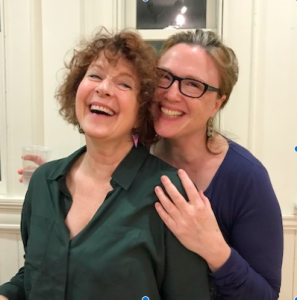“What’s in a Workout?” My Shakespeare Crush #2
My six-week “Shakespeare Workout “was taught by the Jennie Israel and Paula Plum,* founding members of the Actors Shakespeare Project.
ASP began in 2004 with the goal of closing the distance between audiences and Shakespeare’s plays. Since then, productions have been mounted without elaborate sets or costumes in non-traditional community venues: churches and schools and such. The company honors its commitment to education by teaching Shakespeare to teens, including residencies in Department of Youth Services facilities, a summer teacher training intensive, and the Workout.
Israel and Plum are involved in every aspect of ASP, from starring in productions to directing plays to teaching. They are great friends and their mutual respect and affection set a tone for the class that was both focused and rollicking – a word I don’t think I ever used before.
As advertised, the class is a real workout, so we began with warm-ups: running around the room, stretching, crouching and such. We also roared, shrieked, moaned, laughed, and locked eyes with one another.
After ten minutes, I was sweating, panting, and emptied of the day’s cares. I was also relieved of the inhibitions attendant upon being 30-plus years older than any of my classmates, and the dawning realization that the youngest of them knew a whole lot more Shakespeare than I – no surprise given that six of them were college acting students or recent graduates.
Flapping and hooting seemed like a completely counterintuitive – if not nutty — way to prepare for the subject at hand. After all, Shakespeare is hard. You need footnotes, and commentaries, and a Ph.D. in Elizabethan literature wouldn’t hurt.
Before Paula and Jennie handed out our scripts, we paused for a 15-minute refresher on iambic pentameter: a line of verse with five metrical feet, one short/unstressed syllable followed by a long one: da–dum, da–dum, da–dum, da–dum, da–dum.
But soft, what light through yonder window breaks?
It cannot be a coincidence that Shakespeare’s favored cadence is also the rhythm of the human heart: lub–dub, lub–dub. Iambic pentameter and our heartbeats are indispensible, of course, but they have to do their jobs mostly unremarked: too much awareness of either would make life and Shakespeare unbearable.
With this in mind, we were given our scenes: one monologue and one scene with another actor. A few weeks prior to the start of class, we’d each been asked if there was a role or two we’d always wanted to play. I mentioned Kate in Taming of the Shrew and Beatrice in Much Ado About Nothing. A couple of smart women with a lot to say.
For reasons of their own, Jennie and Paula had assigned me Cressida’s monologue from Act III, scene 2 of Troilus and Cressida, a play, I openly confess, I’d never heard of.
My scene was from King Lear, Act 1 scene 4. And I was assigned (holy shit) Lear.
We had barely a moment to smile or kvetch much less read our parts before we were told to put down the scripts and sit facing our scene partners, who in my case, was a beautiful young woman with a newly-minted acting degree, playing Lear’s daughter Goneril. Stationed at our sides were classmates, charged with whispering our parts, line by line, into our ears.
Goneril and I locked eyes and smiled uncomfortably until I was fed my first iambic pentameter. “How now daughter! What makes that frontlet on?”
I repeated the line. And the next, “Methinks you are too much of late in the frown.”
Goneril answered, “Not only, you, sir this your all-licensed fool/ But other of your insolent retinue/ Do hourly carp and quarrel …’
I didn’t understand much of what passed from my ears to my lips, or from Goneril’s lips to my ears. Getting the words out was hard enough. But the emotions were unmistakable: defiance, anger, disbelief, contempt, and outrage. It was an out-of-body experience, or maybe just a long-forgotten one.
After all, we first learn language through the ears as babes in arms, tender faces hovering over us, directing sound and breath our way. And, not incidentally, eyeball-to-eyeball. As grownups, that kind of direct gaze is taboo, rarely broken except by lovers in the first flush, or laser-focused enemies.
And that is how Goneril and I continued. There was no way to read ahead, so I was unprepared for the sting of her mockery, disrespect, and arrogance. Nor could she look away as Lear cursed her in the most intimate terms. “Into her womb convey sterility …/“Dry up in her the organs of increase.”
As Lear, I was relentlessly cruel.
“… If she must teem/ Make it a child of spleen that it may live/ And be a thwart disnatured torment to her.”
How dreadful to say such things. And how thrilling to get out of the way and hand over the reigns to Shakespeare, the master of the multi-chambered human heart.

*Paula Plum & Jennie Israel
My Shakespeare Crush #3. Mean what you say.